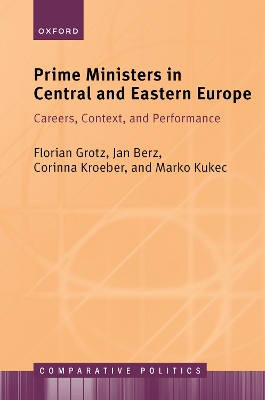Comparative Politics
1 total work
Prime Ministers in Central and Eastern Europe
by Florian Grotz, Jan Berz, Corinna Kroeber, and Marko Kukec
Published 6 February 2025
Prime Ministers (PMs) are the most influential, powerful, and visible politicians in parliamentary democracies. Their prominent role has been increasing in Western democracies due to the 'presidentialization of politics'. But is this also true for new democracies, such as those in post-communist Central and Eastern Europe (CEE)? As politics in CEE has been characterized by high personalization, weak voter-party linkages, and strong media influence of political leaders, prime-ministerial performance may be even more important for the functioning of parliamentary democracy in those countries. At the same time, conventional wisdom suggests that prime ministers in CEE perform weakly because they lack political experience and operate in an extraordinarily difficult context, but this assumption has not been systematically examined.
To close this research gap, this book presents a new conceptual approach to measuring prime-ministerial performance and offers a novel dataset of 131 cabinets in eleven CEE countries between 1990 and 2018. The comparative analyses of this data reveal that the political experience of post-communist prime ministers varies considerably-they range from politically inexperienced outsiders to insiders with long-standing careers in parliament, government, and party leadership. At the same time, multivariate analyses of the quantitative data and qualitative cases demonstrate that variations in the careers, contexts, and performance of prime ministers are systematically connected. In this way, the book not only qualifies conventional assumptions about prime ministers in CEE but also substantiates the theoretical relationship between their careers, contexts, and performance. Prime Ministers in Central and Eastern Europe thus contributes to an enhanced understanding of the functioning of post-communist democracies and provides new insights for scholarly work engaging with political leadership.
Comparative Politics is a series for researchers, teachers, and students of political science that deals with contemporary government and politics. Global in scope, books in the series are characterized by a stress on comparative analysis and strong methodological rigour. The series is published in association with the European Consortium for Political Research. For more information visit: www.ecprnet.eu.
The series is edited by Nicole Bolleyer, Chair of Comparative Political Science, Geschwister Scholl Institut, LMU Munich and Jonathan Slapin, Professor of Political Institutions and European Politics, Department of Political Science, University of Zurich.
To close this research gap, this book presents a new conceptual approach to measuring prime-ministerial performance and offers a novel dataset of 131 cabinets in eleven CEE countries between 1990 and 2018. The comparative analyses of this data reveal that the political experience of post-communist prime ministers varies considerably-they range from politically inexperienced outsiders to insiders with long-standing careers in parliament, government, and party leadership. At the same time, multivariate analyses of the quantitative data and qualitative cases demonstrate that variations in the careers, contexts, and performance of prime ministers are systematically connected. In this way, the book not only qualifies conventional assumptions about prime ministers in CEE but also substantiates the theoretical relationship between their careers, contexts, and performance. Prime Ministers in Central and Eastern Europe thus contributes to an enhanced understanding of the functioning of post-communist democracies and provides new insights for scholarly work engaging with political leadership.
Comparative Politics is a series for researchers, teachers, and students of political science that deals with contemporary government and politics. Global in scope, books in the series are characterized by a stress on comparative analysis and strong methodological rigour. The series is published in association with the European Consortium for Political Research. For more information visit: www.ecprnet.eu.
The series is edited by Nicole Bolleyer, Chair of Comparative Political Science, Geschwister Scholl Institut, LMU Munich and Jonathan Slapin, Professor of Political Institutions and European Politics, Department of Political Science, University of Zurich.
